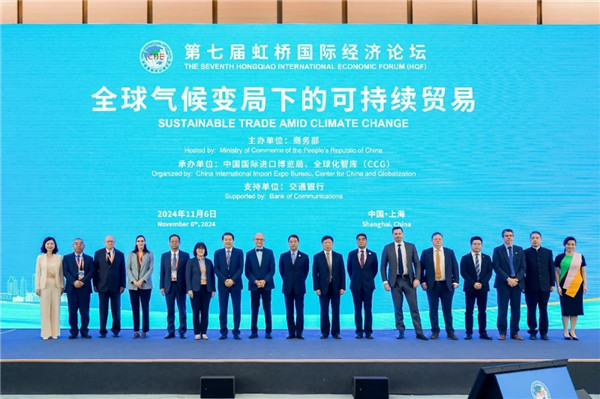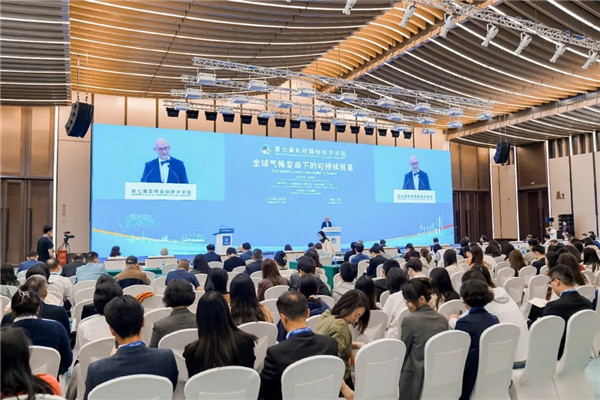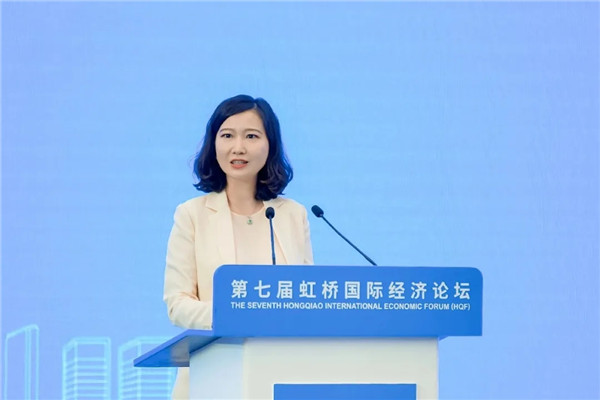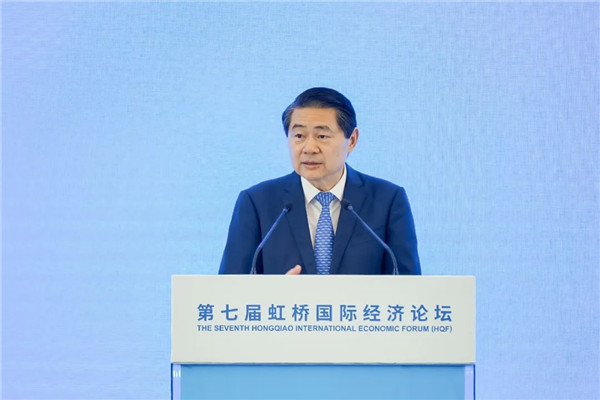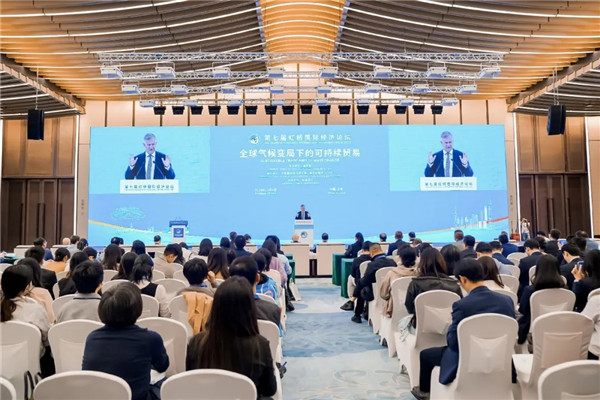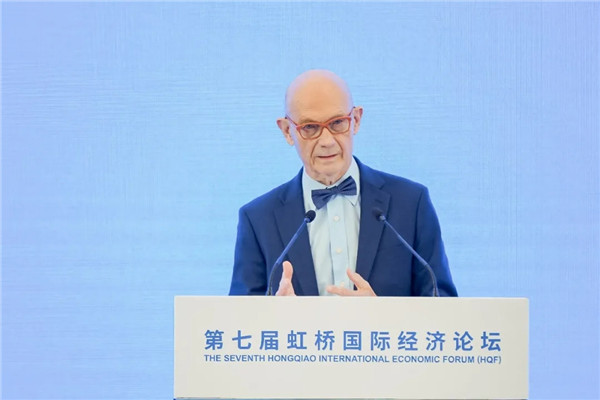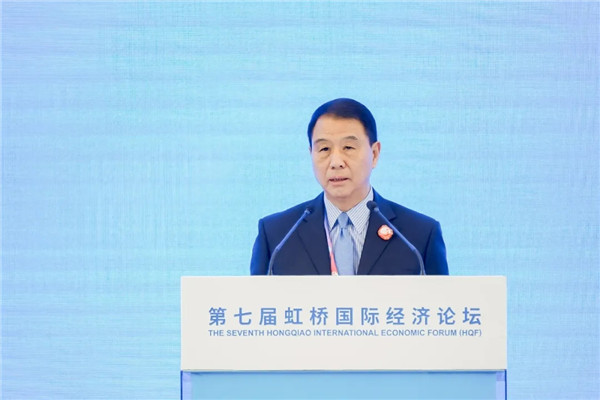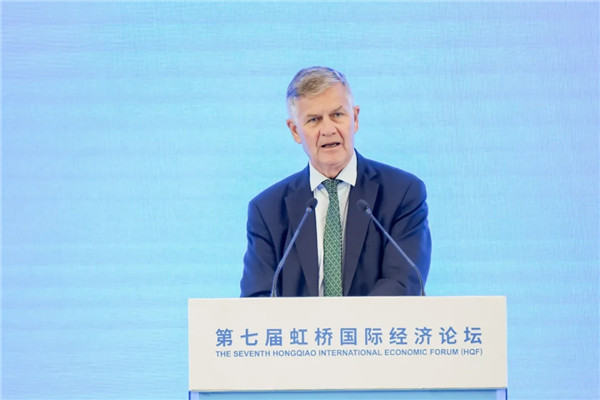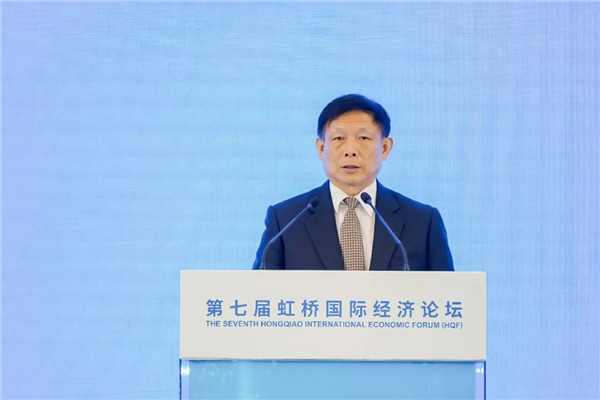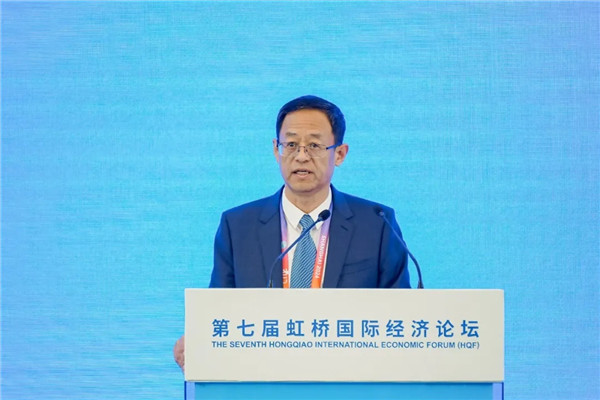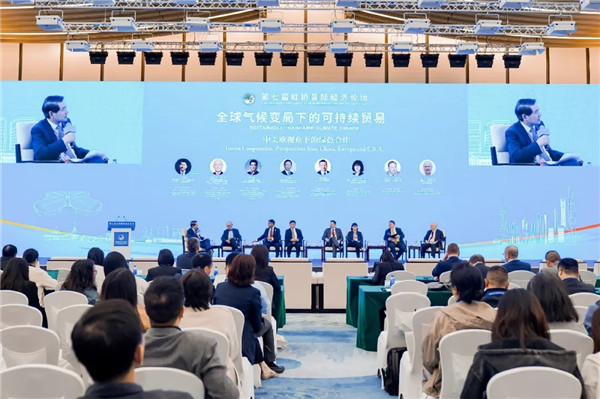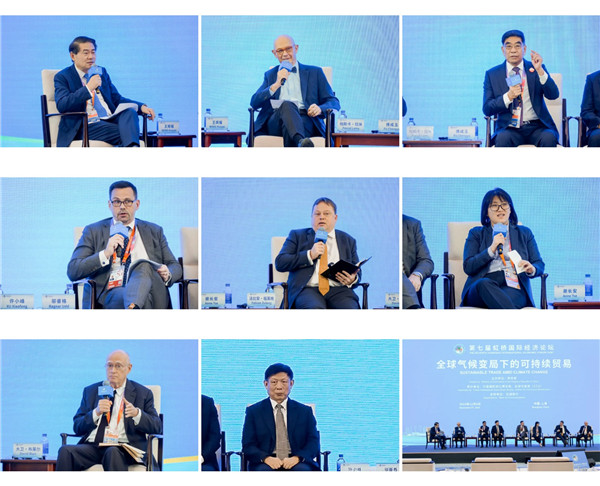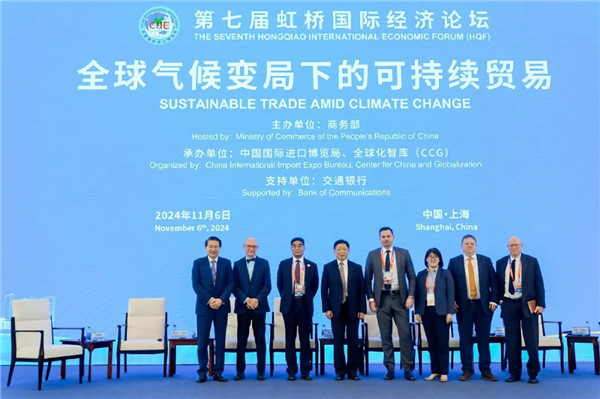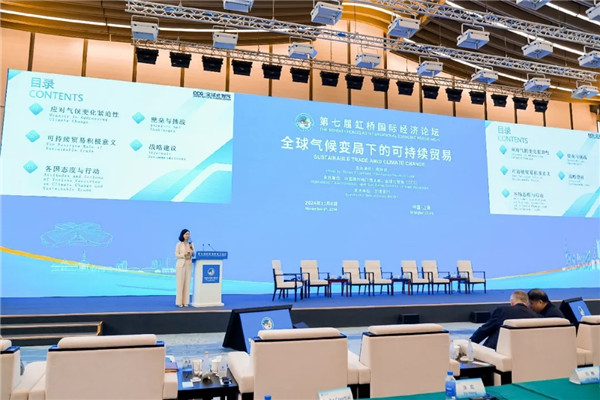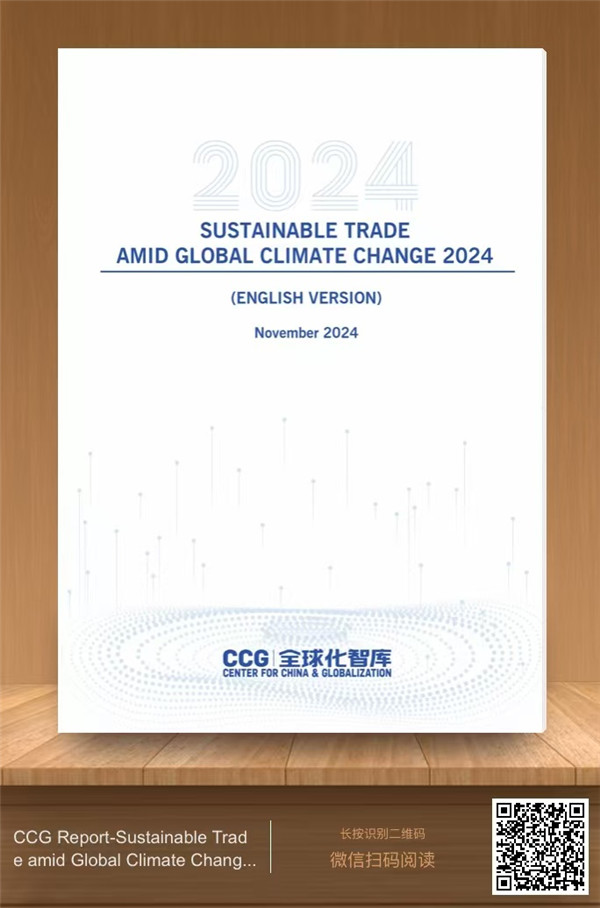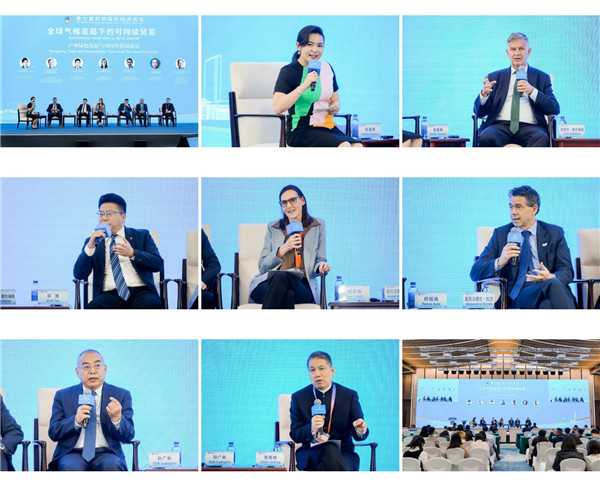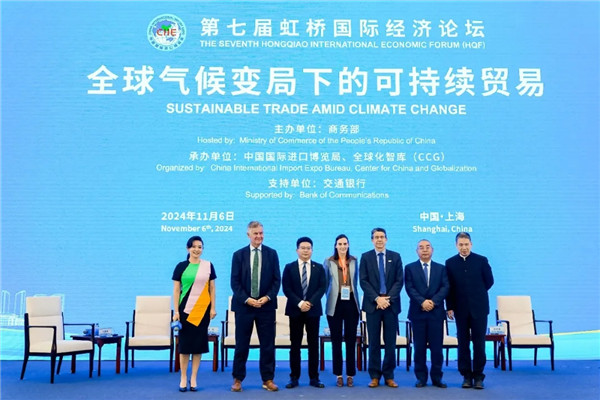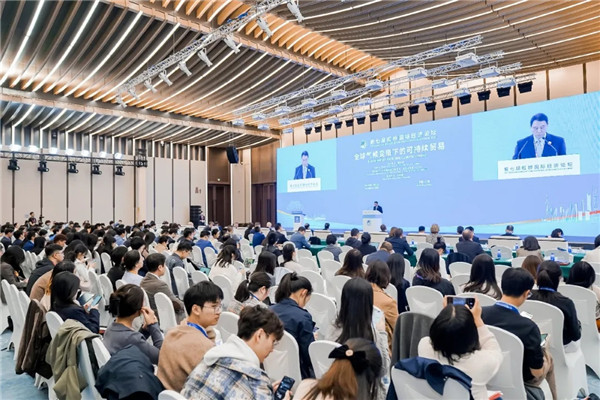CCG Holds Forum on Sustainable Trade amid Climate Change at CIIE
November 06 , 2024
On November 6, 2024, the 7th China International Import Expo (CIIE) Hongqiao International Economic Forum sub-forum “Sustainable Trade amid Climate Change” was successfully held at the National Exhibition and Convention Center in Shanghai. This event was organized by the Ministry of Commerce of the People’s Republic of China and co-hosted by China International Import Expo Bureau and Center for China and Globalization (CCG). Numerous renowned domestic and foreign experts, scholars, and industry leaders attended the event, engaging in in-depth discussions on topics such as green cooperation among China, the U.S., and Europe, and a sustainable trade agenda for global climate mitigation. They exchanged cutting-edge perspectives and offered insights to promote sustainable trade and green industry development in response to global climate challenges.
The forum consisted of an opening ceremony, two panel discussions, and a report release session. It focused on the impact of green trade on building a climate-friendly global trade system, covering topics such as the opportunities and challenges faced by China, the U.S., and Europe in coordinating green industry policies and trade rules, as well as key strategies for enterprises to promote cross-sectoral ecological cooperation.
Mabel Lu Miao, Co-founder and Secretary General of CCG and Founder and Secretary General of Global Young Leaders Dialogue (GYLD) program, presided over the opening ceremony of the forum. She noted that the Hongqiao International Economic Forum not only serves as a crucial platform for global economic exchange but also offers a valuable opportunity to discuss major global issues and explore sustainable development solutions. In the face of increasingly severe global climate change, today’s forum has invited policymakers, business leaders, and experts from various countries and regions to gather in person, aiming to pool their wisdom, focus on green trade, deeply analyze the profound impact of climate change on the international economic and trade landscape, and explore potential solutions.
Henry Huiyao Wang, Founder and President of CCG and Former Counselor to China’s State Council, delivered the organizer’s welcome address. He pointed out that climate change has become an urgent threat to humanity and is now regarded as a top global challenge. Therefore, driving the green transition and sustainable development of global trade is crucial. In recent years, the scale of global green trade has continued to expand, with China surpassing the EU to become the world’s largest green trading nation, while also achieving significant progress as the largest producer of clean energy. The development of global sustainable trade requires enhanced cooperation among countries and the improvement of sustainable trade rules. As a leading global think tank, CCG is committed to working with all sectors to promote sustainable trade and engage in in-depth discussions in this field.
Pascal Lamy,former Director-General of the World Trade Organization (WTO), Coordinator of the Jacques Delors Institutes (Paris, Berlin, Brussels), Vice-Chairman of the Paris Peace Forum; Yi Xiaozhun, former Vice Minister of Commerce of China, former Deputy Director-General of the WTO, former China’s ambassador to the WTO; Erik Solheim, Co-Chair of the Europe-Asia Centre, former Minister of the Environment and International Development of Norway, former Under-Secretary-General of the United Nations and Executive Director of the United Nations Environment Programme; Xu Xiaofeng, President of China Meteorological Service Association, former Deputy Director of China Meteorological Administration; and Zhang Baojiang, President of Bank of Communications, delivered opening keynote speeches at the forum.
In his speech, Pascal Lamy emphasized that while trade aims to enhance economic efficiency, which can progress at varying speeds, environmental protection concerns the long-term survival of the planet. Balancing the two is highly complex and requires meticulous coordination. To better address the current situation, he offered the following suggestions: First, trade actors should take on corresponding environmental responsibilities. Second, the prominence of environmental issues within WTO discussions should be elevated. Third, the WTO should establish a compatibility forum to make environmental concerns a priority for trade parties. Fourth, the WTO’s green subsidy framework needs to be revisited. Finally, international systems, including the global financial system, should also consider the interconnectedness of trade and the environment.
Yi Xiaozhun emphasized that as the world’s largest developing country, China has committed to achieving carbon neutrality in the shortest time in history, which is undoubtedly a major contribution to the world. When addressing the challenge of climate change, the WTO is indispensable. Although the WTO does not have specific rules targeting climate change, it provides an critical platform for addressing the relationship between climate change and trade. Tackling climate change and advancing green economic transitions should not violate multilateral trade rules, nor come at the cost of weakening the multilateral trade system. Any unilateral trade measures taken in disregard of WTO rules are inherently unfair. In advancing the global climate agenda, major economies should strengthen the coordination of relevant trade policies within the WTO framework to ensure that trade measures taken to combat climate change align with multilateral trade rules.
Erik Solheim noted that China plays an indispensable role in the global green transition; without China’s participation, such a transition would be impossible. Given the potential return of Trump as the next U.S. President, certain established policies may continue, and trade issues at a global scale could become more pronounced. Against this backdrop, China and the EU should strengthen cooperation to jointly uphold the multilateral trade mechanisms and systems. Specifically, Europe needs to recognize the positive nature of green competition, while China should further open its market to international products, which would not only benefit businesses but also align with the shared interests of all countries. Additionally, China and the EU must continue to prioritize cooperation with the U.S., working to further refine the multilateral system, making it more robust and environmentally sustainable.
XU Xiaofeng pointed out that although there is a broad international consensus on actively addressing climate change, the current situation remains challenging. So far, the concentration of greenhouse gases in the atmosphere, which contribute to rising temperatures, has not been effectively controlled. In response to the multiple challenges and far-reaching impacts of climate change, the Chinese government released the National Climate Change Adaptation Strategy 2035 in 2022, advocating for a coordinated approach that integrates mitigation, adaptation, and sustainable development to enhance the climate resilience of China’s socio-economic systems. The topics discussed at this forum are highly aligned with the principles of this strategy. It is believed that the exchange of views and ideas among the participants will help harness collective wisdom, enhance understanding of climate change and sustainable trade issues, and foster a positive policy environment and societal response to climate change.
ZHANG Baojiang shared insights and experiences from the perspective of the Bank of Communications, focusing on the role of the financial industry in supporting the development of green trade. He noted that the vigorous promotion of green trade is a necessary requirement for sustainable development. In this process, the financial sector should: first, support green manufacturing to facilitate the greening of products and production processes; second, enhance green logistics services to reduce the carbon footprint of product transportation; and third, provide green trade financing to better meet clients’ needs for sustainable development. He emphasized that sustainable development is a shared endeavor for all of humanity and requires ongoing effort. The Bank of Communications is willing to work together with all parties to strengthen exchanges and cooperation in supporting green trade and promoting green development.
The firstpanel discussion that followed was themed “Green cooperation: Perspectives from China, Europe and the U.S.,” and was hosted by Dr. Henry Huiyao Wang. Amid escalating global climate change and environmental challenges, China, the U.S., and the EU, as the world’s three largest economies, have a significant impact on global carbon emissions, technological innovation, and market guidance. Key issues that require urgent consideration include how these three parties can promote global sustainable cooperation through policy coordination, how to effectively integrate sustainable trade with green finance, and the role that businesses should play in this process.
In this context, Pascal Lamy; Fu Chengyu, Member of the Standing Committee of the 12th CPPCC National Committee, former Chairman and Secretary of the Party Group of Sinopec; Xu Xiaofeng; Ragnar Udd, Chief Commercial Officer of BHP; Anne Tse, Chief Executive Officer of PepsiCo Greater China and Chief Consumer Officer of PepsiCo Asia Pacific; Fabian Zuleeg, Chief Executive of the European Policy Centre, Member of the Executive Board of Transparency International EU, Honorary Fellow at the Europa Institute of the University of Edinburgh; and David Blair, Chief Economist of Alliance of Global Talent Organizations (AGTO), focused on the development of the green economy from the perspectives of China, the U.S., and Europe. They explored the key role of businesses in sustainable green trade, aiming to encourage the three parties to overcome policy differences and geopolitical barriers, achieve coordination of green standards and policies, and promote technological innovation, cross-border cooperation, and the development of green finance, thereby advancing the global sustainable economic process together.
As extreme weather events become more frequent and environmental pressures increase, identifying and addressing challenges such as technical barriers, policy coordination, and economic costs in sustainable trade has become urgent for accelerating the global green transition and enhancing the economic resilience of nations. During the forum, Mabel Lu Miao, Co-founder and Secretary-General of CCG and Founder and Secretary-General of Global Young Leaders Dialogue (GYLD) program, released a report titled ” Sustainable Trade Amid Global Climate Change 2024″ . This report emphasizes the importance of global cooperation in addressing climate change and advocates for building a sustainable trade system through promoting green technology innovation, policy coordination, and supply chain transformation, while opposing the use of trade barriers as a means to address climate issues. The report aims to provide practical strategies for governments and businesses, illustrating how to achieve a win-win situation between climate change mitigation and economic growth within a global cooperation framework, and offers solutions from a Chinese perspective to contribute to global environmental goals.
The second panel discussion is themed “Navigating trade and sustainability:Views from the green industries”, hosted by Zhang Shanhui, TV anchor and commentator at China Global Television Network (CGTN). As global climate issues and resource scarcity challenges intensify, industrial green development and sustainable trade have become crucial for achieving long-term economic growth and environmental protection. In the context of the green economy increasingly becoming an important measure of international competitiveness, exploring the future of green development and sustainable trade is particularly urgent, as it relates to the stability of the global economy and the improvement of the ecological environment.
Erik Solheim; Hua Tao, General Manager of Wuliangye Yibin Co., Ltd.; Penne Kehl, Asia Pacific Group President of Cargill Agriculture and Trading; Alejandro Duran, Vice President of Subsurface and Consulting Services, Baker Hughes; Sun Guangbin, Senior Vice President & Chief Sustainability Officer of JA Solar; and Zhou Jinfeng, Founding President of China Biodiversity Conservation and Green Development Foundation, President of World Academy of Sustainable Development, explored the relationship between global trade and green sustainable development from the perspective of leading green industries. They focused on how sustainable practices shape green supply chains, enhance resource efficiency, and promote cross-industry cooperation and innovation. The discussion also highlighted the crucial role of international cooperation and policy coordination in helping the green industry navigate complex trade environments, aiming to achieve the dual goals of environmental sustainability and economic growth.
During the forum, guest speakers shared insightful solutions for addressing climate change and advancing economic green transitions, while delving into the critical role of institutions like the WTO in tackling climate challenges. They unanimously agreed that sustainable trade is not only a necessary measure to address climate change but also a key driver for the global economic transition. Cooperation among countries on this issue has become a central pathway for collectively tackling climate challenges and achieving sustainable development. In the process of formulating and implementing relevant policies, nations can draw on a wealth of experiences and successful cases to foster mutual learning and exchange, accelerating the global green transition.
The CIIE is the world’s first import-themed national-level exposition and a key initiative personally planned, proposed, deployed and promoted by President Xi Jinping. It is a pragmatic step by China to promote the development of an open world economy and support economic globalization, while also being a tangible application of China’s concept of a community with a shared future for mankind and its Global Development Initiative. The 7th CIIE, themed “New Era, Shared Future”, is held in Shanghai from November 5 to 10, coinciding with the Hongqiao International Economic Forum. This event is an important economic diplomacy activity following the successful convening of the Third Plenary Session of the 20th Central Committee of the Communist Party of China (CPC). The overall exhibition area exceeds 420,000 square meters, with participation from 152 countries, regions, and international organizations in both the national and enterprise exhibitions. The Hongqiao Forum features a main forum and 19 sub-forums.
